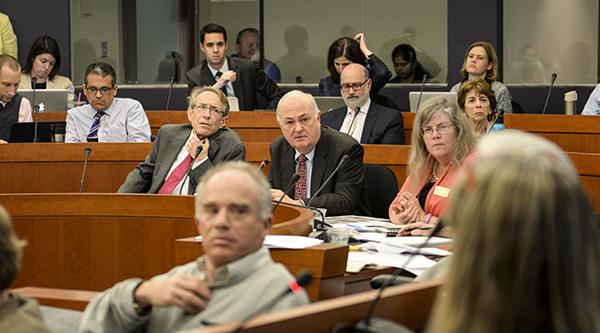GW staff members said they watched as their colleagues packed up, some escorted by security officials, after they were dismissed from their jobs without warning last week.
Officials announced last week that the University would lay off 46 staff members and eliminate other already vacant positions. After they were not allowed to say goodbye to some of their peers, staff members said they’re offended and were not consulted before the layoffs or warned that they were coming.
Members of the Staff Association said that 10 percent of the 300 positions in the Division of Information Technology were terminated, according to reports they received from University officials. Staff members said other departments that were hit included development, human resources and Gelman Library. They ranged from regular staff positions to director-level and vice president-level spots, and some of those laid off were employees who had been at GW for as long as 30 years, they said.
“The vast majority of the 46 affected staff were removed immediately from their positions without warning and were abruptly escorted off campus by security without an option of saying goodbye to coworkers,” said one staff member, who spoke on the condition of anonymity for fear of retaliation.
University President Steven Knapp said at a Faculty Senate meeting Friday that GW cut positions within the central administration by 5 percent as part of efforts to reduce expenses. Other administrative lines that haven’t been filled were cut as well. All departments across the University have been asked to strip about 5 percent from their budgets.
“This is not an across-the-board slashing, like sequestration. It’s been a very careful, targeted restructuring to, where possible, find ways to reduce costs,” Knapp said.
Knapp said the University is now relying on fundraising efforts after two years of missed revenue projections because of declining graduate student enrollment. GW relies on tuition to cover 75 percent of its costs, while donations help fund most of the rest.
“Our greatest competitive disadvantage bar none is that most of our expensive operation is covered by our endowment and by philanthropy, which is one of the reasons we’re in our campaign right now,” Knapp said.
He said the University’s $1 billion campaign, which publicly launched last June, has raised more than $700 million but it can take longer to secure bigger pledges.
GW has historically lagged behind its peers in terms of how much it can pull in annually through donations, and the current campaign marks the first time it has aimed to raise $1 billion. The University’s development arm raised just $84 million in 2009, and the alumni donor rate has hovered at the relatively low rate of about 10 percent a year.
The Staff Association released a statement on Friday morning, saying the combination of layoffs and recent reductions to tuition benefits show that staff positions are “easy targets” when administrators are determining where to make cuts.
Officials announced at a Faculty Senate meeting in September that GW would cover 90 percent of tuition for 18 credits a year for employees enrolled in degree programs. It used to cover 96 percent of tuition for 21 credits a year.
The Staff Association also called for more communication between the University administration and staffer members in decisions about employment and benefits.
“Staff must be offered participation in discussions directly related to their futures at GW,” the release read. “To exclude staff from these conversations may offer fewer obstacles for immediate budget relief, but it lacks foresight regarding the impact on staff welfare and internal relations.”
A University spokeswoman declined to comment on which positions were eliminated, who will take over their responsibilities, how many vacant positions were eliminated, or how GW will help those who lost their jobs to transition.
Vice President for Human Resources Sabrina Ellis said in a GW release last week that the decisions for which positions to cut “were made by units carefully with much forethought.”
“We want the best for all our employees, and we will work to help those in transition as well those in newly restructured units,” she said.
Staff cuts came just a week after an announcement that the University would restructure staff roles to streamline hierarchical ladders and make it easier for employees to be promoted within their own departments.
Joseph Cordes, the chair of the Faculty Senate’s finance committee, said GW eliminated staff positions because revenue grew by 4 percent while expenses grew by 8 percent last year.
“The only two ways you got to fix it is to raise the bridge or lower the water, and they’re clearly trying to do that,” Cordes said.
Noel Radomski, the director for the Wisconsin Center for the Advancement in Postsecondary Education, said administrative cuts are “very common” when dealing with budget cuts.
Radomski said that staff cuts are most logical because staff member are not tenured like faculty, and students lose access to courses when tenured, associate or adjunct professor numbers are reduced.
“They try to reduce the harm to the core of the university mission which is teaching and, secondarily, research and service,” Radomski said.
Mel McIntire contributed reporting.







